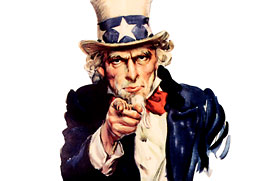College Students Lack Knowledge in History and Politics
June 24, 2008
 New research shows that most college students don’t know the sequential order of civil war battles and other historical facts about American wars, as well as general knowledge of politics.
New research shows that most college students don’t know the sequential order of civil war battles and other historical facts about American wars, as well as general knowledge of politics.
The Intercollegiate Studies Institute (ISI), who analyzed the data, revealed that college seniors scored an average of 52.7 percent correct on the series of war-history-related questions that were asked of them. College freshman scored an average of 47.5 percent correct.
“… Educators, especially those at America’s colleges, need to do a better job of teaching students about this nation’s struggles to battle injustice and those that have died preserving our freedom,” said Dr. Richard Brake, the director of university stewardship at ISI.
The 60-multiple-choice survey questions had four subject areas: American history, government, international relations and the market economy. Fourteen thousand randomly selected college seniors and freshman on 50 campuses nationwide took the survey. The University of Connecticut, Department of Public Policy, administered the study.
In the study, Concordia University in Nebraska added the most knowledge to its students; seniors outscored freshman by 14.4 percent. Cornell University seniors gained the least knowledge, -7.1 percent, from freshman to senior. Both school’s seniors still received a failing grade on average. Harvard seniors scored best, but the overall average was 69.6 percent, a D+ grade.
The study revealed that colleges that do well in popular rankings with U.S. News & World Report–Yale, Duke, Cornell and Princeton–typically don’t do well in advancing civic knowledge. The rankings do not take into account any measure of knowledge or skills acquired in college, the study notes.
Findings concluded that students who gained more civic knowledge were more likely to vote and engage in other civic activities than students who gained less. And college seniors whose families engaged in frequent conversations about history and current events tended to learn more.
Minority college seniors answered less than half of the exam questions correctly on average.
According to the study, some college students appeared to have “unlearned” what they once knew, a phenomenon called “negative learning.” Defenders of the colleges who scored low in gaining civic knowledge stated that students spend their college years on different, or more advanced, subjects and critical thinking skills. In response, the ISI questions whether students can think rationally on a subject they know little about.
Most seniors at Princeton, Cornell, Carnegie, Mellon, Washington, Wheaton and Rochester had not completed even one American history course according to the study. “What that means is that these colleges, like the vast majority of American colleges and universities, do not require their students for graduation to take an American history course,” said Dr. Brake. “It is our considered belief that this has contributed mightily to the inability of American undergraduates to gain a working knowledge of the story of their country, something that if allowed to continue, will make our citizenry less able to govern themselves wisely in the future.”
A phone call to several of these universities and visiting their Web sites produced confirming results. Princeton University’s Web site, for example, states, “Princeton is committed to offering an academic program that allows each student to achieve a truly liberal education. Although each department and school has its own requirements, the University requirements for graduation transcend the boundaries of specialization and provide all students with a common language and common skills.” For some majors, an “historical analysis” class is offered.
Up until the late 60s and 70s, Dr. Brake states that many of the top schools had core curricula that required all students to take basic subjects like history, literature, philosophy, math and government courses. Now, as long as certain distribution requirements are met–which Dr. Brake contends are purposely broad and vague–students can take, essentially, whatever they want.
So why is learning about U.S. history so important?
“I know it’s a cliché, but one of the great values in learning about your own history, and that of other cultures, is that by doing so, you have a greater likelihood of not repeating the mistakes of the past, as well as emulating the successes,” said Dr. Brake. “This is particularly important for a self-governing republic that asks its citizens to exercise sound judgment when selecting their present and future leaders. Historical knowledge is essential to the cultivation of prudence and wisdom, two essential virtues in self-governing societies.
“A firm knowledge of history also tends to cure one of both naive utopianism as well as abject pessimism, since you become aware that mankind is capable of both great good and great evil, and so you become less susceptible to sweeping over-generalizations of all kinds. In that sense, history tends to make one less abstract and ideological,” said Dr. Brake.
Dr. Brake also states that knowing history can help people with everyday problem-solving, since problem-solution variables have already been considered and the outcomes revealed.
On a philosophic note, Dr. Drake states that a respect for history encourages a respect for the best of culture, since historical memory is very closely tied to the maintenance of the successful habits, beliefs, customs, and traditions that make up a way of life.
(cont.)
Pages: 1 2



 Facebook
Facebook Twitter
Twitter Google Bookmarks
Google Bookmarks email
email Print
Print PDF
PDF StumbleUpon
StumbleUpon del.icio.us
del.icio.us Yahoo! Buzz
Yahoo! Buzz Ping.fm
Ping.fm Reddit
Reddit Digg
Digg Live
Live LinkedIn
LinkedIn MySpace
MySpace Technorati
Technorati RSS
RSS